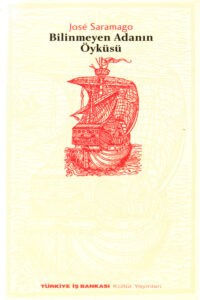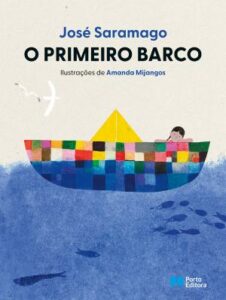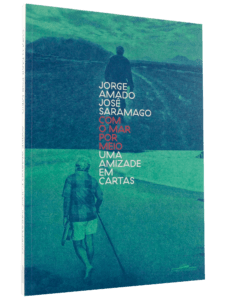The Tale of the Unknown Island

A man came to the king's door and said to him,
Give me a boat.
Portugal

2018 (17th edition)
Language
Portuguese
The calligraphy on the cover is by the writer António Mega Ferreira.
One day, a man went to the king's door to ask for a boat, but that was the door of petitions, and he was not received by the king. After much insistence and knocking at many doors through the intricacies of the royal bureaucracy, he managed to get the king to finally give him the much-desired boat. The cleaning woman at the royal palace was the only crew she could find, and after the boat had been outfitted and cleaned, they slept that night on the pier. The next morning they baptized the vessel and, around noon, with the tide, the Unknown Island finally set out to sea, in search of itself.
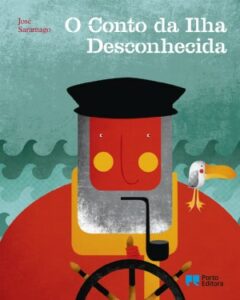
2017; 2019 — Mozambique Special Edition (Kingdom of Letters Collection)
Illustrations by Fatinha Ramos
Language
Portuguese
A man went to the king's door and said, "Give me a boat.".
Set in an indeterminate time and place, the story of the man who wanted a boat to search for the unknown island promises to be the story of all men who fight against conventions in pursuit of their dreams and themselves.
The Kingdom of Letters Collection was born from the desire to combine the magic of the best stories of all time with the ever-renewed reading experiences we can find in them. In the Kingdom of Letters, the king is called Dream and the queen is Imagination.
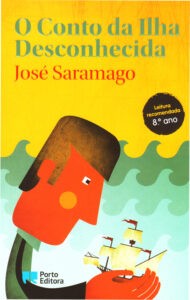
2017; 2019 — Mozambique Special Edition (Kingdom of Letters Collection)
Illustrations by Fatinha Ramos
Language
Portuguese
A man went to the king's door and said, "Give me a boat.".
Set in an indeterminate time and place, the story of the man who wanted a boat to search for the unknown island promises to be the story of all men who fight against conventions in pursuit of their dreams and themselves.
The Kingdom of Letters Collection was born from the desire to combine the magic of the best stories of all time with the ever-renewed reading experiences we can find in them. In the Kingdom of Letters, the king is called Dream and the queen is Imagination.
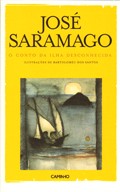
Editorial Path
1999, 12th ed., 2013
Illustrations by Bartolomeu dos Santos
Language
Portuguese
One day, a man went to the king's door to ask for a boat, but that was the door for petitions, and he was not received by the king. After much insistence and knocking on many doors through the intricacies of royal bureaucracy, he finally managed to get the king to give him the much-desired boat. The cleaning woman from the royal palace was the only crew he could muster, and after equipping and cleaning the boat, they slept that night on the dock. The following morning they christened the vessel and, at midday, with the tide, the Unknown Island finally set sail, in search of itself.
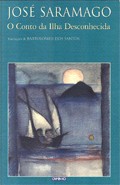
Editorial Path
1999, 12th ed., 2013
Illustrations by Bartolomeu dos Santos
Language
Portuguese
One day, a man went to the king's door to ask for a boat, but that was the door for petitions, and he was not received by the king. After much insistence and knocking on many doors through the intricacies of royal bureaucracy, he finally managed to get the king to give him the much-desired boat. The cleaning woman from the royal palace was the only crew he could muster, and after equipping and cleaning the boat, they slept that night on the dock. The following morning they christened the vessel and, at midday, with the tide, the Unknown Island finally set sail, in search of itself.
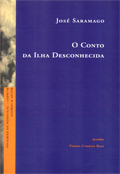
Portugal Pavilion – Expo'98 / Assírio & Alvim
1997
Language
Portuguese
Drawings by Pedro Cabrita Reis
Germany
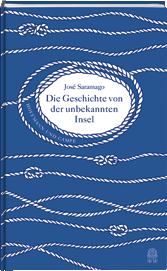
Hoffmann and Camp
2014 (Trans.: Ray-Güde Mertin)
Language
German
Ein Mann bittet beim König um ein Schiff, damit er die unbekannte Insel suchen kann. Obwohl der König nicht daran glaubt, dass es noch unbekannte Inseln gibt, erhält der Mann sein Schiff und macht sich auf die Reise.
Literaturnobelpreisträger José Saramago erzählt in seinem modernen Märchen von einer Zeit, da niemand mehr an unbekannte Regionen auf dieser Welt glaubt. Niemand bis auf den Mann, dessen Beharrlichkeit am Ende belohnt wird. Poetisch, märchenhaft und weise.
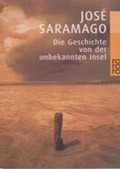
Es gibt keine unbekannte Insel mehr, sagt der König. Aber er gibt dem Mann trotzdem das erwünschte Boot. Eine Scheuermagd fährt mit dem Suchenden hinaus. Im Schein der untergehenden Sonne essen sie ihr karges Abendbrot, dann legen sie sich schlafen. Ein zauberhaftes Märchen des Literatur-Nobelpreisträgers von 1998.

Es gibt keine unbekannte Insel mehr, sagt der König. Aber er gibt dem Mann trotzdem das erwünschte Boot. Eine Scheuermagd fährt mit dem Suchenden hinaus. Im Schein der untergehenden Sonne essen sie ihr karges Abendbrot, dann legen sie sich schlafen. Ein zauberhaftes Märchen des Literatur-Nobelpreisträgers von 1998.
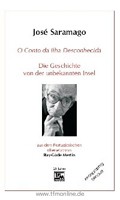
TFM
2005 (bilingual edition), 2007 (Translated by Ray-Güde Mertin)
Language
German
TFM
2005 (bilingual edition), 2007 (Translated by Ray-Güde Mertin)
Brazil
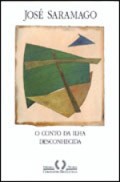
A man goes to the king and asks him for a boat to travel to an unknown island. The king asks him how he can know that this island exists, since it is unknown. The man argues that all islands are like that until someone lands on them. This short story by José Saramago can be read as a parable of a dream fulfilled, that is, as a song of optimism in which will or obstinacy makes fantasy anchor in a safe harbor. Before that, however, it is subjected to a series of clashes with the status quo, with the consolidated state of things, as if merit came from resistance to adversity and the right to realization was born from merit. Between desiring a boat and having it ready to depart, the traveler somehow alters his idea of an unknown island and how to reach it, and this flexibility certainly makes him more able to obtain what he dreamed of. "...That it is necessary to leave the island to see the island, that we do not see ourselves if we do not leave ourselves...", we read at a certain point. In this movement of distancing oneself in order to understand, the critical eye of José Saramago is imprinted, whose optimism seems nourished by roots that penetrate deep into the ground. Previously unpublished in book form, The Tale of the Unknown Island is illustrated by eight watercolors by Arthur Luiz Piza.
Chile
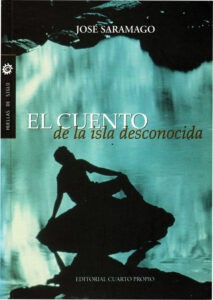
Editorial Cuarto Propio
2000 (Translated by Pilar del Río)
Language
Spanish
Editorial Cuarto Propio
2000 (Translated by Pilar del Río)
Korea

hainaim
2007
Language
Korean
hainaim
2007
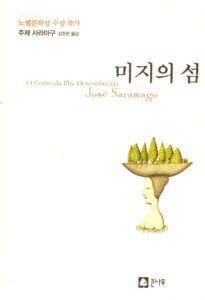
Print Korea Agency
2000
Language
Korean
Print Korea Agency
2000
Spain
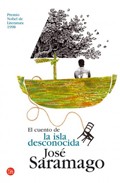
Alfaguara / Punto de Lectura
1998, 2002, 2007 (Trans.: Pilar del Río)
Illustrations by Manuel Estrada
Language
Spanish
A historical success, the intention of a Portuguese nobleman to be authorized by the king to use one of his carabels in the search for the unknown island, serves the author as a pretext to create a fable fabled by the modern man. «… a sweet and subtle story about love and the search for personal identity.» The Washington Post Book WorldSaramago shows us that dreaming, sometimes, is the true path to happiness.
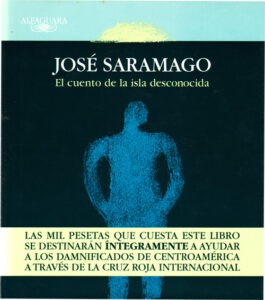
Alfaguara
1998, 2002, 2007 (Trans.: Pilar del Río)
Special edition in support of the International Red Cross.
Language
Spanish
Alfaguara
1998, 2002, 2007 (Trans.: Pilar del Río)
Special edition in support of the International Red Cross.
USA
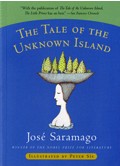
A man went to knock at the king's door and said, Give me a boat. The king's house had many other doors, but this was the door for petitions. Since the king spent all his time sitting at the door for favors (favors being offered to the king, you understand), whenever he heard someone knocking at the door for petitions, he would intend not to hear. . .” Why the petitioner required a boat, where he was bound for, and who volunteered to crew for him, the reader will discover in this delightful fable, a philosophic love story worthy of Swift or Voltaire.
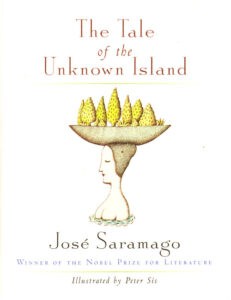
A man went to knock at the king's door and said, Give me a boat. The king's house had many other doors, but this was the door for petitions. Since the king spent all his time sitting at the door for favors (favors being offered to the king, you understand), whenever he heard someone knocking at the door for petitions, he would intend not to hear. . .” Why the petitioner required a boat, where he was bound for, and who volunteered to crew for him, the reader will discover in this delightful fable, a philosophic love story worthy of Swift or Voltaire.

This collection, available exclusively in e-book form, brings together the twelve novels (and one novella) of the great Portuguese writer José Saramago, with an introductory essay by Ursula Le Guin. From Saramago's early work, like the enchanting Baltasar & Blimunda and the controversial Gospel According to Jesus Christ, through his masterpiece Blindness and its sequel Seeing, to his later fables of politics, chance, history, and love, like All the Names and Death with Interruptions, this volume showcases the range and depth of Saramago's career, his inimitable narrative voice, and his vast reserves of invention, humor, and understanding.
Finland
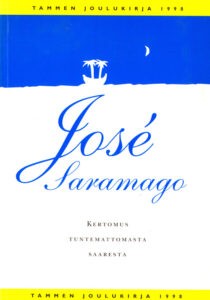
Tammi
1998
Language
Finnish
Tammi
1998
France
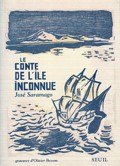
Seuil Jeunesse
2001 (Trans.: Geneviève Leibrich)
Illustrations by Olivier Besson
Language
French
Even though it is impossible that there is no longer an island, a man embarks with a servant. Et les voilà defendantis dans une même quete, songeant l'un à l'autre sans Nunca se l'avouer…
Greece
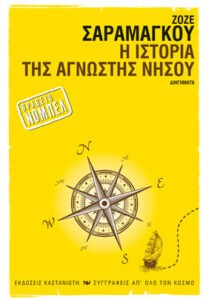
2000, 2014 [Trans: Athina Psillia (Αθηνά Ψυλλιά)]
In a volume with Almost Object
Language
Greek
Ένας άνθρωπος ζητάει ένα καράβι για να βρει την «άγνωστη νήσο». Ποια όμως είναι αυτή η άγνωστη νήσος; Πώς ο καθένας από εμάς μπορεί να την αναγνωρίσει; Πώς αναγνωρίζουμε τον ίδιο τον εαυτό μας; Ένας δικτάτορας πέφτει από την καρέκλα του. Ένας οδηγός προσπαθεί να βρει βενζίνη σε περίοδο κρίσης του πετρελαίου και μεταδίδει τη νεύρωσή του στο αυτοκίνητό του. Ένας βασιλιάς προσπαθεί να αποκλείσει το θάνατο από την επικράτειά του. Kάποια αντικείμενα επαναστατούν στην ανατριχιαστικά γραφειοκρατική κοινότητα των ανθρώπων. Ένας κένταυρος νοσταλγεί το μυθικό παρελθόν του. Kι ένα εφηβικό άχτι εκδικείται το. and αντίστροφο. Eπτά ιστορίες για εκείνοτο κομμάτι της πραγματικότητας που διαφεύγει από κάθε λογική διεργασία. διηγήματα την κατανόηση της τέχνης του μεγάλου νομπελίστα συγγραφέα.
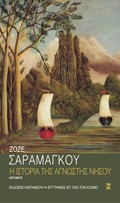
2000, 2014 [Trans: Athina Psillia (Αθηνά Ψυλλιά)]
In a volume with Almost Object
Language
Greek
Ένας άνθρωπος ζητάει ένα καράβι για να βρει την «άγνωστη νήσο». Ποια όμως είναι αυτή η άγνωστη νήσος; Πώς ο καθένας από εμάς μπορεί να την αναγνωρίσει; Πώς αναγνωρίζουμε τον ίδιο τον εαυτό μας; Ένας δικτάτορας πέφτει από την καρέκλα του. Ένας οδηγός προσπαθεί να βρει βενζίνη σε περίοδο κρίσης του πετρελαίου και μεταδίδει τη νεύρωσή του στο αυτοκίνητό του. Ένας βασιλιάς προσπαθεί να αποκλείσει το θάνατο από την επικράτειά του. Kάποια αντικείμενα επαναστατούν στην ανατριχιαστικά γραφειοκρατική κοινότητα των ανθρώπων. Ένας κένταυρος νοσταλγεί το μυθικό παρελθόν του. Kι ένα εφηβικό άχτι εκδικείται το. and αντίστροφο. Eπτά ιστορίες για εκείνοτο κομμάτι της πραγματικότητας που διαφεύγει από κάθε λογική διεργασία. διηγήματα την κατανόηση της τέχνης του μεγάλου νομπελίστα συγγραφέα.
Netherlands
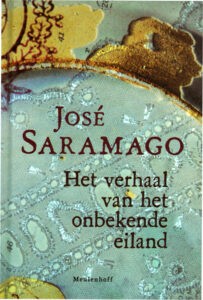
Meulenhoff
2006 (Translated by Harrie Lemmens)
Language
Dutch
Meulenhoff
2006 (Translated by Harrie Lemmens)
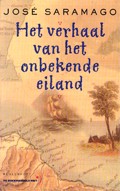
Meulenhoff
2006 (Translated by Harrie Lemmens)
Language
Dutch
Meulenhoff
2006 (Translated by Harrie Lemmens)
India
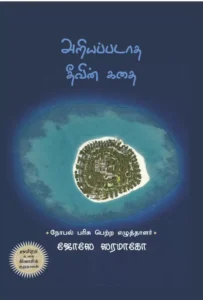
Kalachuvadu Publications
2018 (Translated by K. Anandh)
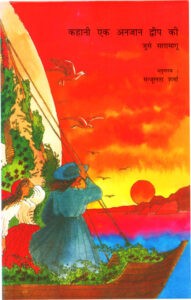
Camões Institute (New Delhi)
2006 (Trans: Manjulata Sharma) (Hindi)
With the support of the Camões Institute — Portuguese Cultural Centre, New Delhi
Language
Hindi
Camões Institute (New Delhi)
2006 (Trans: Manjulata Sharma) (Hindi)
With the support of the Camões Institute — Portuguese Cultural Centre, New Delhi
Israel
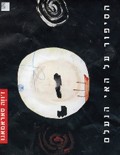
(מרים טבעון)]”איש אחד התדפק על שער המלך, ואמר לו, תן לי ספינה. בבית של המלך היו עוד שערים רבים, אבל זה היה שער הבקשות. בילה את כל זמנו בישיבה ליד שער התשורות (תשורות שהביאו לו, יש להבין), הרי בכל פעם ששמע מישהו דופק על שער הבקשות, היה מתעלם מנוכחותו, ורק כאשר הפך ההדהוד המתמשך של מקוש הברונזה לא רק פומבי אלא אף שערורייתי והטריד את מנוחת השכנים שאפילו אינו עונה) האיש, כי לא היתה דרך להשתיק את העניין”… כך נפתח הסיפור של סאראמאגו, אגדה מודרנית על החירות להיזרק אל הלא-ידוע. בעוד רוב האנשים מתעניינים באיים הנעלמים רק כשהם חדלים להיות נעלמים, ויש להם צורך לדעת-מראש לאן מועדות פניהם – נדע מהו האי הנעלם שמחפש האיש רק כשנגיע אליו, וכנראה אף-פעם לא נגיע, כי אם נגיע הוא יחדל להיות נעלם… אף האדם הנוסע כמוהו כאי, ועליו לצאת מעצמו כדי לראותו. לפיכך “הסיפור על האי הנעלם” הוא גם סיפור על הזוגיות, על ההתבודדות בשניים, המאפשרת לנו לצאת מעצמנו, בלי לעזוב, כדי לחפש את עצמנו. לחפש, לאו דווקא למצוא. זהו סיפור שופע חן והומור, תענוג צרוף של רגש, שנינות וקסם. הספר כולל 27 ציורי צבע של אסף בן צבי המקיימים דיאלוג מרשים עם דמיונו הבלתי-נדלה של סאראמאגו. הוא ראה אור בעברית ב-2002, כמחווה של הספריה החדשה לאחד מגדולי הסופרים שלה, במלאת שמונים למחבר. אולם הוא בראש-ובראשונה מתנה לעצמנו, לכל מי שיודע שהספרות העולמית בפתח המאה העשרים-ואחת היתה חסרה המון בלי החוויה, הריגוש והתובנות האנושיות שספריו של סאראמאגו מעניקים לנו.

2009 [Translated by Miriam Tivon]
(in a volume with Object Almost — Centaur and Revenge)
Language
Hebrew
שלושה סיפורים שבהם מביט סאראמאגו, בשלושה סגנונות ומשלוש פרספקטיבות, ב”אי הנעלם”: איש ואשה לבדם.
הסיפור על האי הנעלם נפתח באיש שמתדפק על שער הבקשות בארמונו של מלך ומטריד את מנוחת השכנים. המלך עצמו מבלה את כל זמנו ליד שער התשורות שמביאים לו, ולכן מי שפותחת לבסוף את שער הבקשות כדי טפח היא האשה המנקה. אך אין לה ברירה אלא להביא את המלך אישית, כדי לשמוע את הבקשה המוזרה של “המטורף חסר-התקנה”: הלה מבקש ספינה בשביל לחפש את האי הנעלם, בעולם שבו כל האיים כבר התגלו ומופו. כך נפתחת האגדה המודרנית הזאת, השנונה והמרהיבה, שתתגלגל לסיפור מסע שופע חן וקסם, שהוא גם סיפור התאהבותם של איש ואשה.
קנטאור הוא סיפור פנטסטי על חצי-סוס חצי-גבר, שריד אחרון לשבט הקנטאורים המיתולוגי, הנקלע לעולם מודרני ונקרע תחת זרם-התודעה המסוכסך בשל שתי הישויות המנוגדות שבו. המפגש המרטיט של חצי-האיש עם אשה שלמה מוליך את הסיפור אל שיאו.
פיצוי הוא סיפור אכזרי בריאליזם שלו, שמתחולל בו מפגש ראשון של נער עם מבטה של נערה. אומנם נמצאת בסביבה גם הצפרדע מאגדת הנסיכה, אבל זו רק צוללת , “כאילו ריפאו את עצמם מעיוורונם”.
Italy
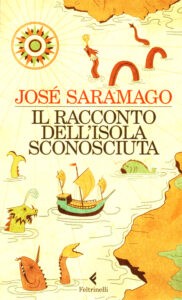
2015 (Translated by Rita Desti, curated by Paolo Collo; cover and illustrations “Atlante” by Battista Agnese — Correr Museum, Venice)
Language
Italian
Un uomo ottiene dal re una caravella per partee alla ricerca di un'isola sconosciuta, che anchor no comparison sulle carte geografiche. Alla ricerca si unisce la donna delle pulizie del palazzo del re. Un'incantevole favola d'amore, masterfully sospesa tra realtà and sogno.
“Tutte le isolate, anche quelle conosciute, som sconosciute finché non vi si sbarca.”
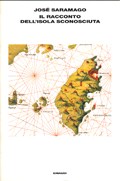
Einaudi
1998 (Translated by Rita Desti, curated by Paolo Collo)
Language
Italian
The sconosciuta isolation is a mobile phone that appears and compares the fantasy card but is well balanced in the heart of the night. A favola d'amore raccontata dal Premio Nobel per la Letteratura 1998.
Japan

Artist House
2001
Language
Japanese
Artist House
2001
Mexico
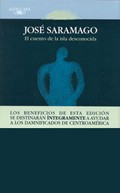
The benefits of this edition are intended entirely to help the damned of Centroamérica
UK
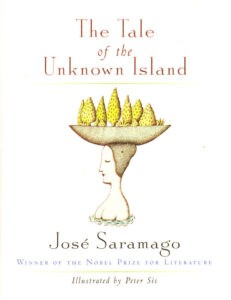
‘'A man went to knock at the king's door and said, Give me a boat. The king's house had many other doors, but this was the door for favors (favours being offered to the king, you understand), whenever he heard someone knocking on the door for petitions, he would intend not to hear…'Why the petitioner required a boat, where he was bound for, and who volunteered to crew for him and what position it was found to be carrying the reader will discover as this short narrative unfolds. And at the end it will be clear that what night appears to be a children's fable is in fact a wry, witty Philosophical Tale that would not have displeased Voltaire or Swift.’Saramago writes possibly the most beautiful but certainly the most precise and differentiated Portuguese prose of our time”Walter Haubrich, Frankfurter Allgemeine Zeitung”Saramago is a writer of formidable talent and extraordinary imagination”La Repubblica, Milan”He is one of the rare contemporary novelists who works out his text as a veritable narrative mechanism: the carefully planned, somewhat complex architecture of his books them the tautness found in the best mystery novels, whose construction is of course their determining factor”Libération, Paris”To speak of the novels of José saramago is to speak of the sheer pleasure of reading”O Diário, Lisboa
Serbia
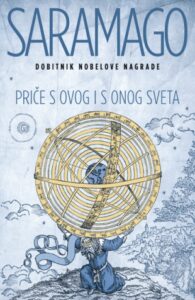
2013 (Trans.: Jasmina Nešković)
Included in the work Priče s ovog is onog sveta
Language
Serbian
Šta se događa kada se stvari koje ljudi upotrebljavaju pobune protiv svojih korisnika?
Kako jedan car pokušao da izoluje smrt?
Kakva je sudbinavozača, praktično zarobljenih u svojim kolima?
Zašto strada poslednji kentaur koji je vekovima struggleo šumama, bežeći od ljudi? zbirke parabola Priče s ovog is onog sveta i Putnikov prtljag, jednu zbirku pripovedaka Tobožnji predmet i novelu Priča o nepoznatom ostrvu, njegove pripovesti svedoče o sporim ali sigurnim koracima kojima se pisoc približavao svojoj pravoj vokaciji – romanu. U ovoj knjizi njegovih izabranih priča čitalac će naći ne samo mnoštvo ideja koje će blink zaokupljati čitavog života, već i sve osnovne odlike jednog neponovljivog književnog rukopisa, toliko drugačijeg da ga je nemoguće oponašati.„Velikan evropske književnosti iznosi nam u pričama svoj osoben pogled na uvad društvenih vrednosti, otuđenje i političku represiju, nudeći svoj odgovor na takve pojave: kada sve propadne, fold metaphor je alternative najbolja.“ Morning Star„Ovde se majstor pera ogleda u kraćim, inventivnim proznim formama, i ishod je impresivan i lucidan. Saramagov dar iu pričama se neosporno ispoljio kao iu njegovim romanima.“ Publishers Weekly
Sweden
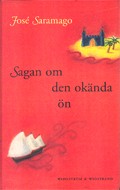
«Vad då för en okänd ö, frågade kungen och höll sig för skratt, som om det var en komplett galninig han hade framför sig, en galning med mani på segling som det inte vore bra att säga emot så här i början, Den okända ön, upprepade mannen, Nonsens, det finns inte längre några okända öar längre, De finns på kartorna allesammans, På kartorna finns bara de kända öarna…»Sagan om den okända ön är en ömsint skimrande novell om kärlek och om människans obändiga drift att söka nya världar bortom haven. In the text series for the Oceanerna theme vid världsutställningem in Lissabon 1998.
Thailand
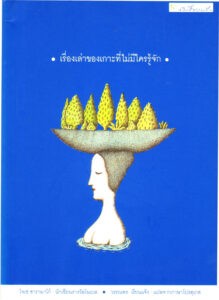
Morning Books
2002 (Trans.: Wannaporn Reanjang)
Illustrations by Peter Sis
Language
Thai
นิทานปรัชญาเกี่ยวกับก ารเดินทางตามหาความสุข ความฝัน ความรัก และตัวเอง ซึ่งในที่สุดก็พบว่าสิ่งที่เฝ้า ตามหานั้นไม่ต้องออกเดินทางไปหา ณที่ใดๆ เพราะสิ่งนั้นอยู่ในใจเรานั่นเอง เนื้อเรื่องดำเนินไปอย่างเรียบๆ แต่มีอารมณ์ขันและมุขเสียดสีสอดแทรกอยู่ ถ้าคุณเคยประทับใจกับ ”เจ้าชายน้อย” เรื่องนี้จะแ
Turkey
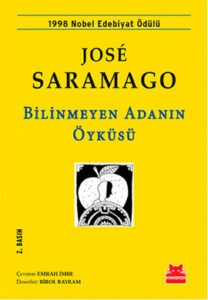
“Bir adam kralın kapısını çalmış ve ona demiş ki, Bana bir tekne ver.”
Bilinmeyen adaların kalmadığına inanılan bir dönemde bilinmeyen ada arama cesaretine sahip bir adamla böyle bir cesareti görüp hayatını değiştirebileceğine inanan bir kadının büyük usta Saramago'nun eşsiz anlatısında edebiyat tarihine geçen yolculukları böyle başlar. Emrah İmre'nin Portekizceden çevirisi ve Birol Bayram'ın desenleriyle okurun minör başyapıtlarından olacaktır Bilinmeyen Adanın Öyküsü.
“"(…) (…)”
“Saramago görünüşte sade bir öyküyü basit bir dille ve masum karakterlerle aktarıyor; okurlar, hayalperestler ve âşıklar psikolojik, romantik ve toplumsal altmetinleri fark edecektir.”
Publishers Weekly
(Tanıtım Bülteninden)
